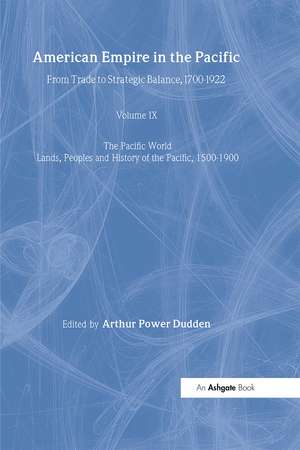American Empire in the Pacific: From Trade to Strategic Balance, 1700-1922: The Pacific World: Lands, Peoples and History of the Pacific, 1500-1900
Editat de Arthur Power Duddenen Limba Engleză Hardback – 5 mai 2004
Din seria The Pacific World: Lands, Peoples and History of the Pacific, 1500-1900
- 9%
 Preț: 1315.78 lei
Preț: 1315.78 lei - 35%
 Preț: 1050.34 lei
Preț: 1050.34 lei - 9%
 Preț: 1316.07 lei
Preț: 1316.07 lei - 29%
 Preț: 1348.74 lei
Preț: 1348.74 lei - 38%
 Preț: 687.26 lei
Preț: 687.26 lei - 29%
 Preț: 1357.17 lei
Preț: 1357.17 lei - 29%
 Preț: 1021.20 lei
Preț: 1021.20 lei - 27%
 Preț: 1050.41 lei
Preț: 1050.41 lei - 29%
 Preț: 1248.24 lei
Preț: 1248.24 lei - 33%
 Preț: 362.00 lei
Preț: 362.00 lei - 29%
 Preț: 1077.71 lei
Preț: 1077.71 lei - 27%
 Preț: 1218.63 lei
Preț: 1218.63 lei - 29%
 Preț: 1023.21 lei
Preț: 1023.21 lei - 28%
 Preț: 1042.56 lei
Preț: 1042.56 lei - 28%
 Preț: 1586.14 lei
Preț: 1586.14 lei - 29%
 Preț: 1181.73 lei
Preț: 1181.73 lei
Preț: 1050.41 lei
Preț vechi: 1446.52 lei
-27% Nou
Puncte Express: 1576
Preț estimativ în valută:
201.06€ • 218.47$ • 168.100£
201.06€ • 218.47$ • 168.100£
Comandă specială
Livrare economică 31 martie-14 aprilie
Doresc să fiu notificat când acest titlu va fi disponibil:
Se trimite...
Preluare comenzi: 021 569.72.76
Specificații
ISBN-13: 9780754630494
ISBN-10: 0754630498
Pagini: 412
Dimensiuni: 174 x 246 x 32 mm
Greutate: 0.89 kg
Ediția:1
Editura: Taylor & Francis
Colecția Routledge
Seria The Pacific World: Lands, Peoples and History of the Pacific, 1500-1900
Locul publicării:Oxford, United Kingdom
ISBN-10: 0754630498
Pagini: 412
Dimensiuni: 174 x 246 x 32 mm
Greutate: 0.89 kg
Ediția:1
Editura: Taylor & Francis
Colecția Routledge
Seria The Pacific World: Lands, Peoples and History of the Pacific, 1500-1900
Locul publicării:Oxford, United Kingdom
Cuprins
Contents: Introduction; Part 1 The American Republic enters world history: The English background of American isolationism in the 18th century, Felix Gilbert; Chinese export porcelain in 18th-century Tidewater Virginia, Julia B. Curtis. Part 2 Westward Destiny: Strategies for finding the Northwest Passage: the roles of Alexander Mackenzie and Meriwether Lewis, Gunther Barth; The legacy of Old Canton, Jacques M. Downs; American continentalism: an idea of expansion, 1845-1910, Charles Vevier; James Polk, Norman A. Graebner; Matthew Calbraith Perry: antebellum precursor of the steam navy, John H. Schroeder; The sale of Alaska in the context of Russian American relations in the 19th century, N.N. Bolkhovitinov. Part 3 Spreadeagle Imperialism: The independent minister: John M.B. Sill and the struggle against Japanese expansion in Korea, 1894-97, Jeffrey M. Dorwart; Assessing public opinion: editorial comment and the annexation of Hawaii - a case study, George F. Pearce; The American remission of the Boxer Indemnity: a reappraisal, Michael H. Hunt; The Panama Canal and sea power in the Pacific, Alfred Thayer Mahan; Protestant missionaries and American colonialism in the Philippines, 1899-1916: attitudes, perceptions, involvement, Kenton J. Clymer. Part 4 World War And Treaty Making: Wilsonian idealism and Japanese claims at the Paris Peace Conference, Noriko Kawamura; American intervention in Russia: the North Russian Expedition, 1918-19, John W. Long; Look back in anger: the western powers and the Washington Conference of 1921-22, Malcolm H. Murfett; Index.
Notă biografică
Arthur Power Dudden, Bryn Mawr College, USA.
Descriere
American Empire in the Pacific explores the empire which emerged from the Oregon Treaty of 1846 with Great Britain and the outcome of the Mexican War in 1848. Together, they signalled the mastery of the United States over the continent of North America; the Pacific Ocean and the ancient civilizations of Asia at last lay within reach. England's East India Company in the 17th and 18th centuries had introduced Asian wares including tea to the American colonists, but wars against France and then the struggle for American independence held back expansion by Yankee entrepreneurs until 1783. Thereafter, from the Atlantic seaboard, American ships began regularly to reach China. Merchants, sailors and missionaries, motivated toward trade and redemption like the Europeans they met along the way, encountered the exotic peoples and cultures of the Pacific. Would-be empire builders projected a manifest destiny without limits. Russian Alaska, the native kingdom of Hawai'i, Japan, Korea, Samoa, and Spain's Philippine Islands, as well as a transcontinental railroad and an isthmian canal, acquired strategic significance in American minds, in time to outweigh both commerce and conversion.
